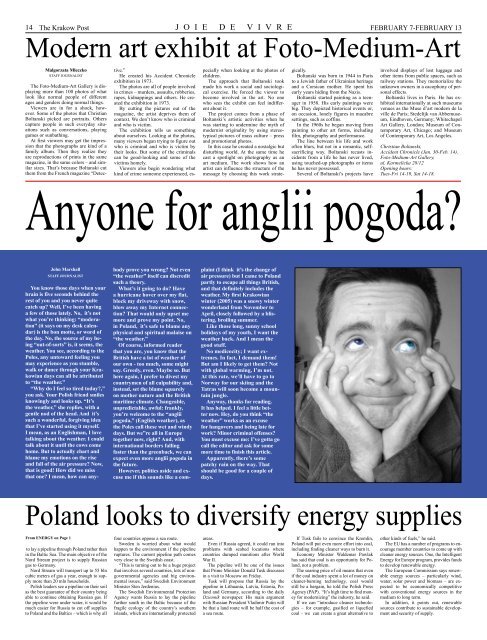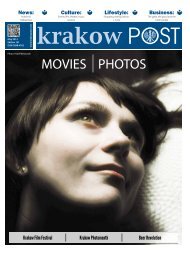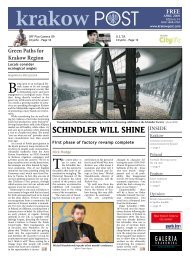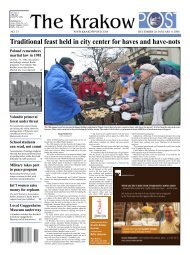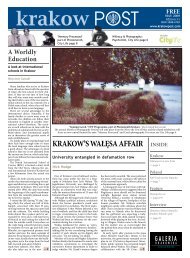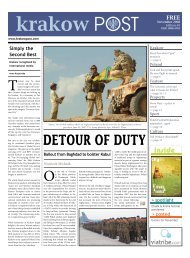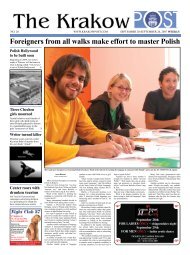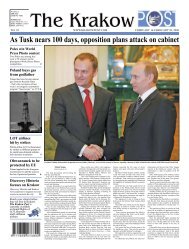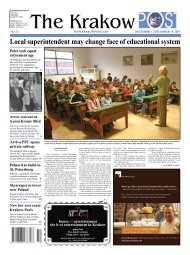Poland looks to Silesia for energy diversification - Krakow Post
Poland looks to Silesia for energy diversification - Krakow Post
Poland looks to Silesia for energy diversification - Krakow Post
Create successful ePaper yourself
Turn your PDF publications into a flip-book with our unique Google optimized e-Paper software.
14 The <strong>Krakow</strong> <strong>Post</strong><br />
j o i e d e v i v r e<br />
FEBRUARY 7-FEBRUARY 13<br />
Modern art exhibit at Fo<strong>to</strong>-Medium-Art<br />
Malgorzata Mleczko<br />
Staff Journalist<br />
The Fo<strong>to</strong>-Medium-Art Gallery is displaying<br />
more than 100 pho<strong>to</strong>s of what<br />
look like normal people of different<br />
ages and genders doing normal things.<br />
Viewers are in <strong>for</strong> a shock, however.<br />
Some of the pho<strong>to</strong>s that Christian<br />
Boltanski picked are portraits. Others<br />
capture people in such everyday situations<br />
such as conversations, playing<br />
games or sunbathing.<br />
At first viewers may get the impression<br />
that the pho<strong>to</strong>graphs are kind of a<br />
family album. Then they realize they<br />
are reproductions of prints in the same<br />
magazine, in the same colors – and similar<br />
sizes. That’s because Boltanski cut<br />
them from the French magazine “Detective.”<br />
He created his Accident Chronicle<br />
exhibition in 1973.<br />
The pho<strong>to</strong>s are all of people involved<br />
in crimes – murders, assaults, robberies,<br />
rapes, kidnappings and others. He created<br />
the exhibition in 1973.<br />
By cutting the pictures out of the<br />
magazine, the artist deprives them of<br />
context. We don’t know who is criminal<br />
and who is victim.<br />
The exhibition tells us something<br />
about ourselves. Looking at the pho<strong>to</strong>s,<br />
many viewers began trying <strong>to</strong> figure out<br />
who is criminal and who is victim by<br />
their <strong>looks</strong>. But some of the criminals<br />
can be good-looking and some of the<br />
victims homely.<br />
Viewers also begin wondering what<br />
kind of crime someone experienced, especially<br />
when looking at the pho<strong>to</strong>s of<br />
children.<br />
The approach that Boltanski <strong>to</strong>ok<br />
made his work a social and sociological<br />
exercise. He <strong>for</strong>ced the viewer <strong>to</strong><br />
become involved in the art. No one<br />
who sees the exhibit can feel indifferent<br />
about it.<br />
The project comes from a phase of<br />
Boltanski’s artistic activities when he<br />
was starting <strong>to</strong> undermine the myth of<br />
modernist originality by using stereotypical<br />
pictures of mass culture – press<br />
and promotional pho<strong>to</strong>s.<br />
In this case he created a nostalgic but<br />
disturbing world. At the same time he<br />
cast a spotlight on pho<strong>to</strong>graphy as an<br />
art medium. The work shows how an<br />
artist can influence the structure of the<br />
message by choosing this work strategically.<br />
Boltanski was born in 1944 in Paris<br />
<strong>to</strong> a Jewish father of Ukrainian heritage<br />
and a Corsican mother. He spent his<br />
early years hiding from the Nazis.<br />
Boltanski started painting as a teenager<br />
in 1958. His early paintings were<br />
big. They depicted his<strong>to</strong>rical events or,<br />
on occasion, lonely figures in macabre<br />
settings, such as coffins.<br />
In the 1960s he began moving from<br />
painting <strong>to</strong> other art <strong>for</strong>ms, including<br />
film, pho<strong>to</strong>graphy and per<strong>for</strong>mance.<br />
The line between his life and work<br />
often blurs, but not in a romantic, selfsacrificing<br />
way. Boltanski recasts incidents<br />
from a life he has never lived,<br />
using <strong>to</strong>uched-up pho<strong>to</strong>graphs or items<br />
he has never possessed.<br />
Several of Boltanski’s projects have<br />
Anyone <strong>for</strong> anglii pogoda?<br />
involved displays of lost luggage and<br />
other items from public spaces, such as<br />
railway stations. They memorialize the<br />
unknown owners in a cacophony of personal<br />
effects.<br />
Boltanski lives in Paris. He has exhibited<br />
internationally at such museums<br />
venues as the Muse d’art modern de la<br />
ville de Paris; Stedelijk van Abbemuseum,<br />
Eindhoven, Germany; Whitechapel<br />
Art Gallery, London; Museum of Contemporary<br />
Art, Chicago; and Museum<br />
of Contemporary Art, Los Angeles.<br />
Christian Boltanski,<br />
Accident Chronicle (Jan. 30-Feb. 14).<br />
Fo<strong>to</strong>-Medium-Art Gallery,<br />
ul. Karmelicka 28/12<br />
Opening hours:<br />
Tues-Fri 14-19, Sat 14-18.<br />
John Marshall<br />
Staff Journalist<br />
You know those days when your<br />
brain is five seconds behind the<br />
rest of you and you never quite<br />
catch up? Well, I’ve been having<br />
a few of those lately. No, it’s not<br />
what you’re thinking: “moderation”<br />
(it says on my desk calendar)<br />
is the bon motte, or word of<br />
the day. No, the source of my being<br />
“out-of-sorts” is, it seems, the<br />
weather. You see, according <strong>to</strong> the<br />
Poles, any un<strong>to</strong>ward feeling you<br />
may experience as you stumble,<br />
walk or dance through your <strong>Krakow</strong>ian<br />
days can all be attributed<br />
<strong>to</strong> “the weather.”<br />
“Why do I feel so tired <strong>to</strong>day?,”<br />
you ask. Your Polish friend smiles<br />
knowingly and <strong>looks</strong> up. “It’s<br />
the weather,” she replies, with a<br />
gentle nod of the head. And it’s<br />
such a wonderful, <strong>for</strong>giving idea<br />
that I’ve started using it myself.<br />
I mean, as an Englishman, I love<br />
talking about the weather. I could<br />
talk about it until the cows come<br />
home. But <strong>to</strong> actually chart and<br />
blame my emotions on the rise<br />
and fall of the air pressure? Now,<br />
that is good! How did we miss<br />
that one? I mean, how can anybody<br />
prove you wrong? Not even<br />
“the weather” itself can discredit<br />
such a theory.<br />
What’s it going <strong>to</strong> do? Have<br />
a hurricane hover over my flat,<br />
block my driveway with snow,<br />
blow away my Internet connection?<br />
That would only upset me<br />
more and prove my point. No,<br />
in <strong>Poland</strong>, it’s safe <strong>to</strong> blame any<br />
physical and spiritual malaise on<br />
“the weather.”<br />
Of course, in<strong>for</strong>med reader<br />
that you are, you know that the<br />
British have a lot of weather of<br />
our own - <strong>to</strong>o much, some might<br />
say. Greedy, even. Maybe so. But<br />
here again, I prefer <strong>to</strong> divest my<br />
countrymen of all culpability and,<br />
instead, set the blame squarely<br />
on mother nature and the British<br />
maritime climate. Changeable,<br />
unpredictable, awful: frankly,<br />
you’re welcome <strong>to</strong> the “anglii<br />
pogoda,” (English weather), as<br />
the Poles call these wet and windy<br />
days. But we”re all in Europe<br />
<strong>to</strong>gether now, right? And, with<br />
international borders falling<br />
faster than the greenback, we can<br />
expect even more anglii pogoda in<br />
the future.<br />
However, politics aside and excuse<br />
me if this sounds like a complaint<br />
(I think it’s the change of<br />
air pressure) but I came <strong>to</strong> <strong>Poland</strong><br />
partly <strong>to</strong> escape all things British,<br />
and that definitely includes the<br />
weather. My first <strong>Krakow</strong>ian<br />
winter (2005) was a snowy winter<br />
wonderland from November <strong>to</strong><br />
April, closely followed by a blistering,<br />
broiling summer.<br />
Like those long, sunny school<br />
holidays of my youth, I want the<br />
weather back. And I mean the<br />
good stuff.<br />
No medicocity; I want extremes.<br />
In fact, I demand them!<br />
But am I likely <strong>to</strong> get them? Not<br />
with global warming, I’m not.<br />
At this rate, we’ll have <strong>to</strong> go <strong>to</strong><br />
Norway <strong>for</strong> our skiing and the<br />
Tatras will soon become a mountain<br />
jungle.<br />
Anyway, thanks <strong>for</strong> reading.<br />
It has helped. I feel a little better<br />
now. Hey, do you think “the<br />
weather” works as an excuse<br />
<strong>for</strong> hangovers and being late <strong>for</strong><br />
work? Minor criminal offenses?<br />
You must excuse me: I’ve gotta go<br />
call the edi<strong>to</strong>r and ask <strong>for</strong> some<br />
more time <strong>to</strong> finish this article.<br />
Apparently, there’s some<br />
patchy rain on the way. That<br />
should be good <strong>for</strong> a couple of<br />
days.<br />
<strong>Poland</strong> <strong>looks</strong> <strong>to</strong> diversify <strong>energy</strong> supplies<br />
From ENERGY on Page 1<br />
<strong>to</strong> lay a pipeline through <strong>Poland</strong> rather than<br />
in the Baltic Sea. The main objective of the<br />
Nord Stream project is <strong>to</strong> supply Russian<br />
gas <strong>to</strong> Germany.<br />
Nord Stream will transport up <strong>to</strong> 55 bln<br />
cubic meters of gas a year, enough <strong>to</strong> supply<br />
more than 20 mln households.<br />
Polish leaders see a pipeline on their soil<br />
as the best guarantee of their country being<br />
able <strong>to</strong> continue obtaining Russian gas. If<br />
the pipeline were under water, it would be<br />
much easier <strong>for</strong> Russia <strong>to</strong> cut off supplies<br />
<strong>to</strong> <strong>Poland</strong> and the Baltics – which is why all<br />
four countries oppose a sea route.<br />
Sweden is worried about what would<br />
happen <strong>to</strong> the environment if the pipeline<br />
ruptures. The current pipeline path comes<br />
very close <strong>to</strong> the Swedish coast.<br />
“This is turning out <strong>to</strong> be a huge project<br />
that involves several countries, lots of nongovernmental<br />
agencies and big environmental<br />
issues,” said Swedish Environment<br />
Minister Sten Jerdenius.<br />
The Swedish Environmental Protection<br />
Agency wants Russia <strong>to</strong> lay the pipeline<br />
further south in the Baltic because of the<br />
fragile ecology of the country’s southern<br />
islands, which are internationally protected<br />
areas.<br />
Even if Russia agreed, it could run in<strong>to</strong><br />
problems with seabed locations where<br />
countries dumped munitions after World<br />
War II.<br />
The pipeline will be one of the issues<br />
that Prime Minister Donald Tusk discusses<br />
in a visit <strong>to</strong> Moscow on Friday.<br />
Tusk will propose that Russia lay the<br />
pipeline in Lithuania, Latvia, Es<strong>to</strong>nia, <strong>Poland</strong><br />
and Germany, according <strong>to</strong> the daily<br />
Dziennik newspaper. His main argument<br />
with Russian President Vladimir Putin will<br />
be that a land route will be half the cost of<br />
a sea route.<br />
If Tusk fails <strong>to</strong> convince the Kremlin,<br />
<strong>Poland</strong> will put even more ef<strong>for</strong>t in<strong>to</strong> coal,<br />
including finding cleaner ways <strong>to</strong> burn it.<br />
Economy Minister Waldemar Pawlak<br />
has said that coal is an opportunity <strong>for</strong> <strong>Poland</strong>,<br />
not a problem.<br />
The soaring price of oil means that even<br />
if the coal industry spent a lot of money on<br />
cleaner-burning technology, coal would<br />
still be a bargain, he <strong>to</strong>ld the Polish Press<br />
Agency (PAP). “It’s high time <strong>to</strong> find money<br />
<strong>for</strong> modernizing” the industry, he said.<br />
If we can “introduce cleaner technologies<br />
– <strong>for</strong> example, gasified or liquefied<br />
coal – we can create a great alternative <strong>to</strong><br />
other kinds of fuels,” he said.<br />
The EU has a number of programs <strong>to</strong> encourage<br />
member countries <strong>to</strong> come up with<br />
cleaner <strong>energy</strong> sources. One, the Intelligent<br />
Energy <strong>for</strong> Europe program, provides funds<br />
<strong>to</strong> develop renewable <strong>energy</strong>.<br />
The European Commission says renewable<br />
<strong>energy</strong> sources – particularly wind,<br />
water, solar power and biomass – are expected<br />
<strong>to</strong> be economically competitive<br />
with conventional <strong>energy</strong> sources in the<br />
medium <strong>to</strong> long term.<br />
In addition, it points out, renewable<br />
sources contribute <strong>to</strong> sustainable development<br />
and security of supply.


